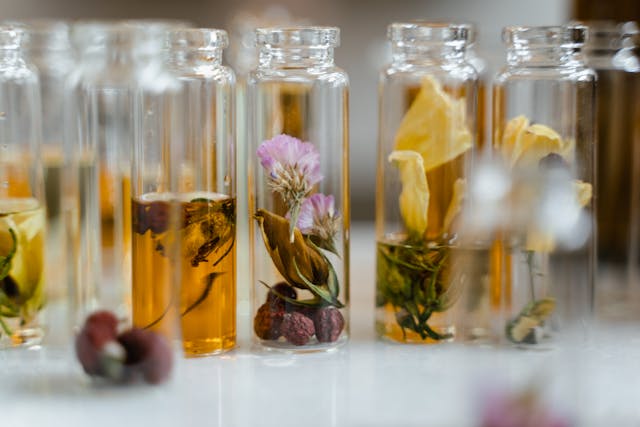
Scent and Healing: A Brief History of Aromatherapy
Photo from Pexels
Aromatherapy, which is commonly described as the art and science of employing the aromatic properties of essential oils for therapeutic purposes, has a long and diverse history dating back thousands of years. This all-encompassing method is based on the belief that inhaling and using essential oils can have a significant impact on physical, psychological, and emotional health. From its early roots in prehistoric cultures to its present resurgence, aromatherapy is an intriguing insight into mankind’s continual association with smell and healing.
- Ancient Origins in Egypt
Aromatherapy has its origins in ancient Egypt when fragrant chemicals were widely used in religious rites, mummification procedures, and daily life. Incorporating certain herbs and plants with their medicinal properties into their spiritual rituals and healing procedures, the Egyptians acknowledged them not just for their smells but also for their medicinal qualities. Oils taken from trees like frankincense and myrrh were Often used with massage techniques, these oils were quite important for both spiritual and physical healing. Emphasizing the cultural value of smells in their civilization, Egyptian hieroglyphs show images of incense burning.
- The Greek Influence on Aromatherapy
The use of natural perfumes for health and well-being evolved further in ancient Greece. Prominent doctors such as Hippocrates, sometimes known as the founder of medicine, argued for the application of aromatic oils in medicinal therapies. Laying the foundation for pharmacognosy the study of medical medications derived from plants the Greeks also started investigating the scientific elements of plant characteristics. As knowledge of essential oils grew, their uses varied, and a greater awareness of how smells can affect the body and psyche resulted. Emphasizing the importance of scent in healing, ancient Greek health practices included this junction of medicine and fragrance as a key component.
- The Preservation of Aromatherapy in the Middle Ages
The usage of aromatic chemicals declined in Europe during the Middle Ages, owing to the increase of superstition and the church’s influence. Still, this time also saw the Arab world preserve and expand on fragrant knowledge. The development of distillation methods made it possible to extract stronger and more concentrated oils, hence extending the range of aromatic compounds accessible for medicinal use. This information found its way to Europe, where the Renaissance spurred fresh enthusiasm for natural therapeutic techniques. The field of aromatherapy was rejuvenated by the combination of old knowledge and fresh discoveries throughout this age, therefore opening the path for its contemporary comeback.
- The Therapeutic Potential of Scents
The healing potential of aromatherapy lies not only in the properties of the essential oils themselves but also in the personal experiences and associations individuals have with specific scents. The sense of smell is deeply intertwined with memory and emotion, making it a powerful tool for healing. Many practitioners advocate for a personalized approach to aromatherapy, encouraging individuals to explore scents that resonate with them personally. This individualized method aligns with the holistic philosophy of aromatherapy, emphasizing the importance of addressing both physical and emotional well-being. As research continues to unveil the intricate connections between scent, memory, and healing, the future of aromatherapy appears promising, with potential applications in diverse fields such as psychology, palliative care, and integrative medicine.
- Professional Guidance in Aromatherapy
Growing interest in aromatherapy has led to several training programs designed to teach people the nuances of this technique. Essential oil qualities, mixing processes, safety precautions, and medicinal uses are just a few of the subjects these courses address. Those eager to learn more about aromatherapy can get these courses to acquire knowledge and techniques for improving their work. Many seminars also stress the need to include aromatherapy in holistic health programs so that attendees can offer all-encompassing treatment. A unique chance to learn about producing fragrant mixes and the historical significance of incense is provided by an online incense crafting course for individuals who like the art of fragrance. These classes not only foster personal development but also help one to appreciate the medicinal and cultural aspects of fragrance.
Conclusion
The history of aromatherapy is evidence of humanity’s ongoing connection with fragrance and healing. From prehistoric societies to modern techniques, the development of aromatherapy shows a great awareness of the interaction among mind, body, and spirit. Aromatherapy is becoming increasingly important as people look for natural, all-encompassing methods for wellbeing and health. Those looking for balance, healing, and well-being in an ever more complicated environment can find resonance in the voyage of smell and its therapeutic advantages investigation. Incense making is a special chance to engage with this rich legacy and invite people to join in the eternal art of aroma and healing.